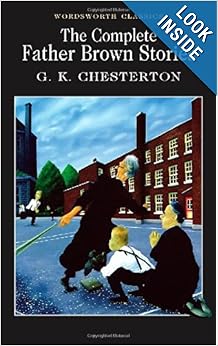This is a large book with many small detective stories written by G.K.Chesterton.
They are quite interesting and amusing, and quite intriguing.
 If you have not read them, I suggest you do. I think you will like them very much.
If you have not read them, I suggest you do. I think you will like them very much.Here is a introduction to the Father Brown Stories.
Father Brown is a short, stumpy Roman Catholic Church priest, "formerly of Cobhole in Essex, and now working in London", with shapeless clothes and a large umbrella, and an uncanny insight into human evil. He makes his first appearance in the story "The Blue Cross" and continues through the five volumes of short stories, often assisted by the reformed criminal M. Hercule Flambeau. Father Brown also appears in a story "The Donnington Affair" that has a rather curious history. In the October 1914 issue of the obscure magazine The Premier, Sir Max Pemberton published the first part of the story, inviting a number of detective story writers, including Chesterton, to use their talents to solve the mystery of the murder described. Chesterton and Father Brown's solution followed in the November issue. The story was first reprinted in the Chesterton Review (Winter 1981, pp. 1–35) and in the book Thirteen Detectives.
Unlike the more famous fictional detective Sherlock Holmes, Father Brown's methods tend to be intuitive rather than deductive. He explains his method in 'The Secret of Father Brown': "You see, I had murdered them all myself... I had planned out each of the crimes very carefully. I had thought out exactly how a thing like that could be done, and in what style or state of mind a man could really do it. And when I was quite sure that I felt exactly like the murderer myself, of course I knew who he was."
Brown's abilities are also considerably shaped by his experience as a priest and confessor. In "The Blue Cross", when asked by Flambeau, who has been masquerading as a priest, how he knew of all sorts of criminal "horrors," he responds: "Has it never struck you that a man who does next to nothing but hear men's real sins is not likely to be wholly unaware of human evil?" He also states a reason why he knew Flambeau was not a priest: "You attacked reason. It's bad theology." The stories normally contain a rational explanation of who the murderer was and how Brown worked it out. He always emphasises rationality: some stories, such as "The Miracle of Moon Crescent", "The Oracle of the Dog", "The Blast of the Book" and "The Dagger With Wings", poke fun at initially sceptical characters who become convinced of a supernatural explanation for some strange occurrence, while Father Brown easily sees the perfectly ordinary, natural explanation. In fact, he seems to represent an ideal of a devout, yet considerably educated and "civilised" clergyman. This can be traced to the influence of Roman Catholic thought on Chesterton. He is characteristically humble, and is usually rather quiet; when he does talk, he almost always says something profound. Although he tends to handle crimes with a steady, realistic approach, he believes in the supernatural as the greatest reason of all.
I did not write this review, but I hope you enjoy.
No comments:
Post a Comment